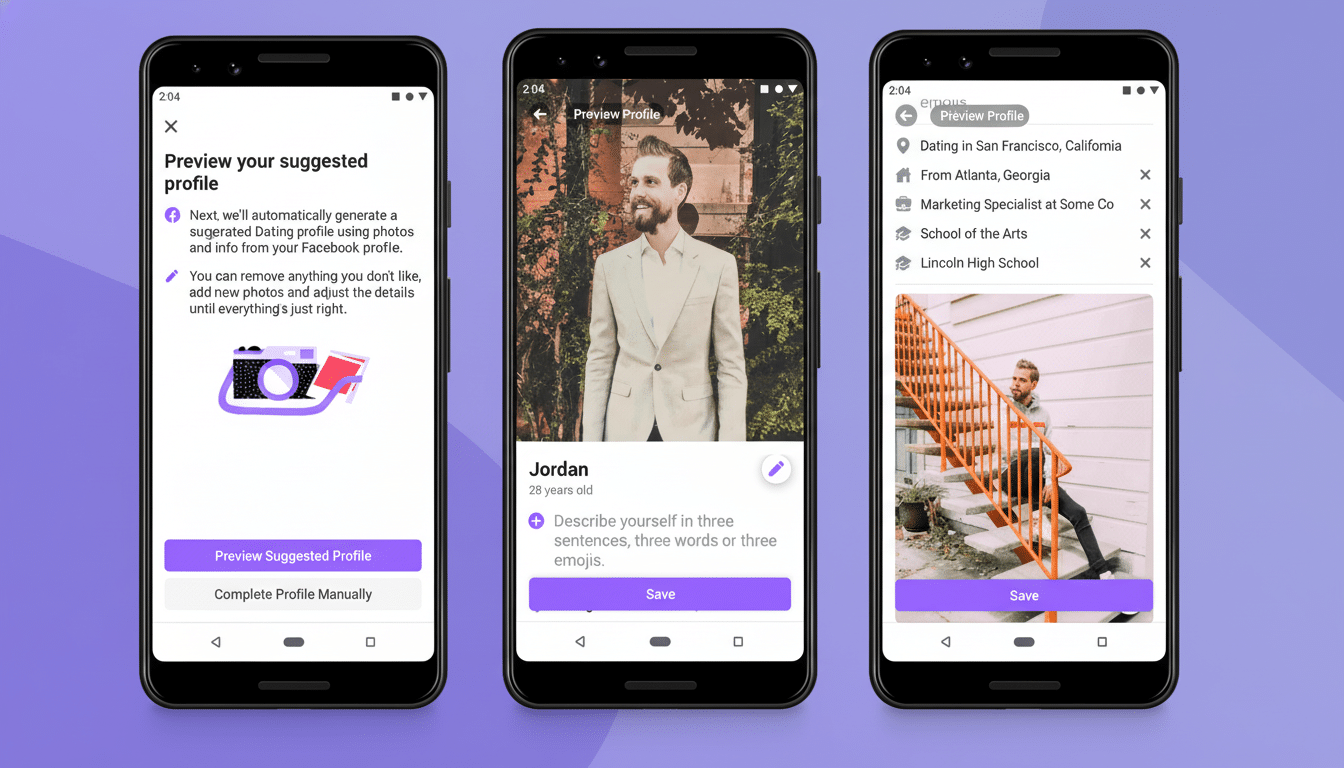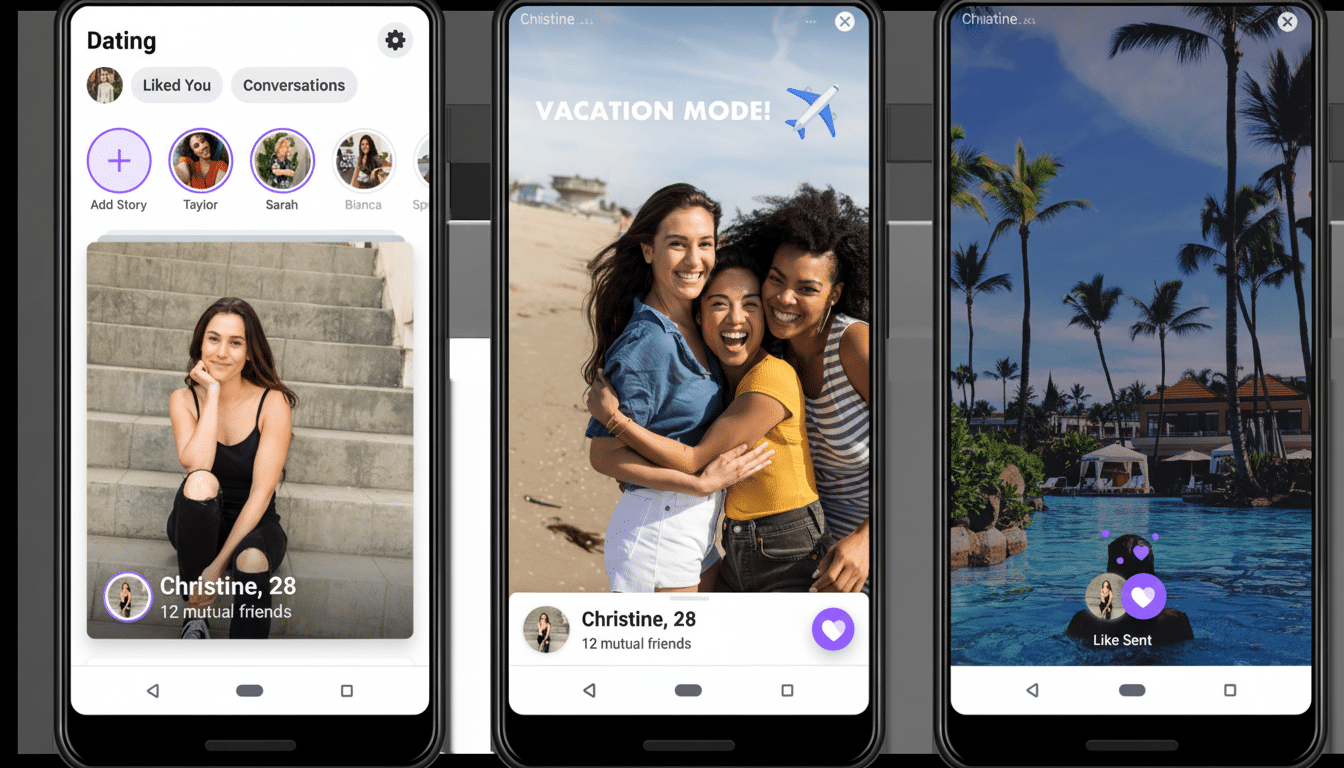Meta is bringing a generative AI element to its matchmaking playbook with an in-app “dating assistant” for Facebook Dating, and the addition of a new random match tool called Meet Cute. The assistant is meant to encourage users toward more ideal connections, clean up profiles and even propose date ideas; Meet Cute delivers a weekly algorithmic wildcard you can chat with or dismiss. The two are elements of a larger push to help make Meta’s free dating service feel more proactive and less like a swipe treadmill.
The AI tool lives in the Matches tab and is rolling out in the U.S. and Canada, according to the company. Meet Cute will introduce one new match each week as the default setting, but users have the option to opt out if they would rather use a standard experience.

What the AI assistant can and can’t do for daters
The assistant takes naturally spoken requests to narrow down matches beyond language filters like age, location and education level. Think: “Find me a Brooklyn woman in tech” or “Show me outdoorsy guys who are into live jazz.” That extra layer of detail might help people surf through the thousands in an otherwise too-broad pool and turn up matches that they could connect with, based on shared niche interests or lifestyle.
And it’s also hoping to lower the cognitive load of dating. Its executives say it can also suggest how to make your profile image more likely to be popular, give you a quick nudge about whether you should message people, and even prompt you with dating advice. You can ask, for instance, for an opening line that makes reference to a match’s marathon photos or a first-date plan below $40 in your neighborhood. Importantly, it keeps the user in control of the last word: it presents output as suggestions (or proposals, if you will) and not computer-generated decisions.
Personalization gains, privacy pitfalls to weigh
AI is integrated right into the search and message funnel, which makes data governance a front-line issue. Questions that users may be particularly interested in include how prompts and preferences are stored, whether they are used to inform ad targeting or ranking, and what controls exist for deleting or exporting that information. Meta has played up personalization, but it has not released granular information about how the assistant stores and uses that data for training — transparency that privacy advocates will be scrutinizing closely.
There’s also the human factor. AI-generated icebreakers can help smooth over awkward openings, but they can lean into sameness or even dishonesty if used excessively. About three-in-ten U.S. adults (29%) have ever used an online dating site or app, according to Pew Research Center, and 13% of internet users have either tried online dating or know someone who has. An aid which aids with tone and structure is useful; one which speaks for you runs the risk of mashing personality down into shiny boilerplate.
Meta’s previous encounters with AI dating advice show the stakes. The company’s previous experiment with a personality that served as an AI dating coach, for example, elicited insults from some of those users before the character was retired. More broadly, independent researchers and media accounts of experiments have raised concerns that Meta’s AI systems can produce inappropriate content or impersonate public figures. Those failures of judgment won’t be easily forgotten as the company deploys its generative tools in a sensitive, intimate context such as dating.

Competition is already fueling demand for AI
The move comes to a market where competitors are experimenting with their own AI helpers. Match Group has teased features like profile photo suggestions and message-prompt ideas; Tinder has tested out AI to choose people’s photos for them; Bumble uses AI in the interest of safety, blurring unsolicited explicit images and powering photo verification. In other words, everyone is experimenting — and most apps are still calibrating where AI fits into the delicate balance between efficiency and authenticity.
For Meta, the bet is that there’s a conversational layer that can make discovery feel less mechanical — and help users convert curiosity into conversation. If the assistant does a better job, this could dramatically increase engagement with, and decrease churn in, a category where users often give up after a few stale exchanges.
What it looks like for daters today on Facebook
Start small and stay specific. Use the assistant to focus what you’re really seeking — interests, routines, deal breakers — not pale generalities. Request two or three opening lines from it and tinker with them until they sound like you. If you are worried about privacy, don’t enter anything in a prompt that seems to suggest it’s looking for sensitive info, and check any settings available for personalization.
On safety, the fundamentals remain the same. The U.S. Federal Trade Commission regularly updates the tally of fraud complaints, and the amounts of money lost to romance scams through specific social networks can be staggering — millions, or even billions of dollars each year. AI will help you spot red flags (misaligned stories, pressure to move off-platform, requests for money), but it can also make scammers more convincing. Chat in-app and withhold numbers until trust has been built, and utilize reporting tools.
Ultimately, think of Meet Cute like an experiment in benign failure. Leave the weekly random match on, and the surprise serendipity it may surface that you’re missing from ultra-optimization is just a thumb tap away. If Meta’s assistant succeeds in turning that serendipity into a substantive chat — without overreaching on privacy, or overstepping with its personality — it might become the most useful feature Facebook Dating has added in years.

